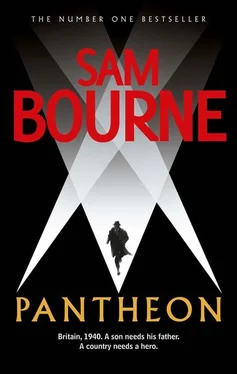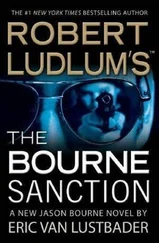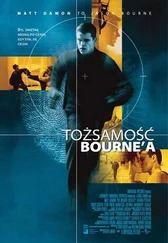Sam Bourne - Pantheon
Здесь есть возможность читать онлайн «Sam Bourne - Pantheon» — ознакомительный отрывок электронной книги совершенно бесплатно, а после прочтения отрывка купить полную версию. В некоторых случаях можно слушать аудио, скачать через торрент в формате fb2 и присутствует краткое содержание. Жанр: Триллер, на английском языке. Описание произведения, (предисловие) а так же отзывы посетителей доступны на портале библиотеки ЛибКат.
- Название:Pantheon
- Автор:
- Жанр:
- Год:неизвестен
- ISBN:нет данных
- Рейтинг книги:3 / 5. Голосов: 1
-
Избранное:Добавить в избранное
- Отзывы:
-
Ваша оценка:
- 60
- 1
- 2
- 3
- 4
- 5
Pantheon: краткое содержание, описание и аннотация
Предлагаем к чтению аннотацию, описание, краткое содержание или предисловие (зависит от того, что написал сам автор книги «Pantheon»). Если вы не нашли необходимую информацию о книге — напишите в комментариях, мы постараемся отыскать её.
Pantheon — читать онлайн ознакомительный отрывок
Ниже представлен текст книги, разбитый по страницам. Система сохранения места последней прочитанной страницы, позволяет с удобством читать онлайн бесплатно книгу «Pantheon», без необходимости каждый раз заново искать на чём Вы остановились. Поставьте закладку, и сможете в любой момент перейти на страницу, на которой закончили чтение.
Интервал:
Закладка:
But even if this was the true motivation for the Oxford evacuation, it still did not answer the question that had been devouring James for nearly a month. Where on God’s earth was his wife? Where was his child?
There was still one more book on the table. He picked it up. It was the latest edition of the American Eugenics Society journal, the volume he had requested. He only had to read the contents to see that it included a lecture by Dr Preston McAndrew of Yale University. His fingers rushed to the page, fumbling in their haste. Finally, he read the introductory paragraph, explaining that the talk had been delivered at a colloquium — not at Yale, but at some far more obscure institution — on Charles Darwin, held the previous November to mark the eightieth anniversary of the publication of On the Origin of Species. It was entitled Cleansing Fire. James read every line, carefully and slowly.
The greatest human frailty, common to those of both strong and weak intellect, is sentiment. Perhaps it is this trait, more than any other, that sets us apart from the animals. Watch any collection of beasts and you will soon see displayed a cold calculation of collective self-interest which eludes us humans. A cat with a litter of kittens will immediately identify the weak one and discard it. Not because she is especially cruel, but because she has calculated what is best overall for her litter. Any animal confronted by a runt will be similarly ruthless; the runt has to go for the good of the whole. We like to call ourselves rational, but in this regard it is the animal kingdom which is the domain of reason. It is human beings — who tend to be moved by the sight of a struggling runt or feeble kitten — who are irrational, so clouded by sentiment that they are unable to make the basic calculations of utility.
If we were not so impaired, we would be able to see quite clearly, even automatically, where our best interests lay. It would be obvious to us that the species as a whole would benefit if we were no longer burdened by those who take much and offer little. If the human litter, as it were, were free of its runts, society would no longer have to provide for the weak and dependent, for such people would not exist. It would, instead, consist solely of those able to make their contribution, to carry the load rather than to be carried. What place would there be for poverty in such a society? Why, none at all. For every man would be a driver, with not a passenger to be seen.
It sounds fantastical to imagine such a society, utopian even. And yet in every generation an opportunity to create that very utopia presents itself. The trouble is that, just as regularly, the human race — soft-headed and sentimental as we are — misses that opportunity. Worse than misses; we actively reject it.
What is this opportunity I speak of? I shall answer that with reference to the man whose work we honour tonight. I know the purists among you dislike the phrase ‘survival of the fittest’ as an inexact summary of Charles Darwin’s work, but it serves as a useful shorthand for my current purpose and I hope you will indulge me.
Since the dawn of time, different animal species have come and gone. Natural selection has proved remarkably effective — ruthless, but effective — in eliminating those who, by definition, were too weak to survive. When cosmic disaster struck the earth, the dinosaurs were eliminated. It was as simple and brutal as that.
Human beings should be no different. When disaster strikes, the weakest should be eliminated, leaving only the strongest to survive. But we humans have made ourselves the exception. We feel compelled to intervene, to get in Nature’s way, to protect those who would otherwise be discarded. Just as we weep at the sight of that rejected kitten, so we become overwhelmed by irrational pity — and prevent Nature from taking its course.
And what is the disaster I have in mind? It is the same as the opportunity I spoke of a moment ago. I am referring, ladies and gentlemen, to war.
War is the human equivalent of that great meteor striking the earth, separating weak from strong. Or rather it should be. But every time it comes we meddle and get in the way, trying to hold up a shield to stave off disaster.
But what if, just once, we stood aside and let war run its course? What if we let it act as Nature intended, as a cleansing fire that might burn through the entire forest, destroying the deadwood, leaving only those plants and flowers that were beautiful and strong enough to survive? Imagine the human stock that would be left: only the very best.
It sounds fanciful, but I believe it is no such thing. Just such an experiment could soon be played out before us, with a single, island race as its subject. The only task — the only duty — for us as American scientists and as American citizens is to make sure that we don’t get in the way. War is coming to our mother country — Great Britain — like a cleansing fire. But it will cleanse nothing if the United States puts out the flames.
Chapter Thirty-seven
He left the book unclosed, sprinted to the nearest exit and galloped down the stairs two at a time. Heading back onto York Street, his mind was running faster than his body, processing and analyzing what he had just read. He could not say he had absorbed its meaning: it was too big, too important.
He turned left and crossed Elm Street, dodging the yellow beams of car headlights switched on in the summer twilight. As he walked down York Street he knew he was taking an absurd gamble, one that was almost certainly doomed. And yet he had no idea where else he could turn.
She had mentioned this location only once, in an aside during their dinner, but it had lodged in his memory. And there it was, just next to the School of Architecture, confirmed by a small sign in the window: the offices of the Yale Daily News.
Dorothy Lake had also said that even in summer, when there was no daily newspaper to produce, there were usually people around — ambitious, would-be editors preparing for the new term. And indeed, when he pushed at the door, it opened.
He seemed to have entered some kind of basement, exposed brick arches rising around him as if he were under a railway bridge. In front were tables covered with newspapers, battered typewriters, rulers and scalpels. The floor was littered with old ink ribbons, photographs, discarded flashbulbs and piles and piles of paper. All around the walls were recent front pages of the newspaper.
James picked his way through this paraphernalia to reach a staircase on the other side, its first few steps similarly covered with debris. To his relief, he could hear voices. He had not even reached the top when he saw Dorothy.
She had her back to him, turning only when a young man — who, from his posture, James took to be the editor — gestured in his direction. Her face, a picture of shock, told him what he already knew. A moment later, she recovered her poise and gave him a bright smile. ‘Dr Zennor!’
James said nothing. He held her gaze for a long moment and felt some small gratification when she blushed. So she was capable of feeling shame. ‘Could we speak? In private?’ he said at last.
Dorothy looked away. She said something he couldn’t quite catch to the editor then walked briskly across the room, her heels clicking on the stone floor. As she passed James on the staircase, he caught the scent of her, as potent as it had been last night, and for a moment felt a renegade stab of desire. Then he turned and followed her.
She tried to seize the initiative, speaking even before they had reached the bottom. ‘James, it’s so good to see you. I’d wondered where you’d-’
‘No need for any of that, Dorothy.’
‘I don’t know what you mean.’ She bit her lip, a gesture of feigned innocence, but he hardened his heart.
Читать дальшеИнтервал:
Закладка:
Похожие книги на «Pantheon»
Представляем Вашему вниманию похожие книги на «Pantheon» списком для выбора. Мы отобрали схожую по названию и смыслу литературу в надежде предоставить читателям больше вариантов отыскать новые, интересные, ещё непрочитанные произведения.
Обсуждение, отзывы о книге «Pantheon» и просто собственные мнения читателей. Оставьте ваши комментарии, напишите, что Вы думаете о произведении, его смысле или главных героях. Укажите что конкретно понравилось, а что нет, и почему Вы так считаете.












